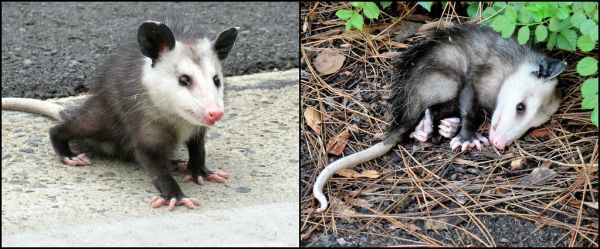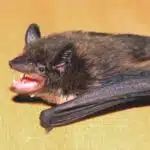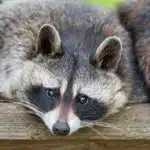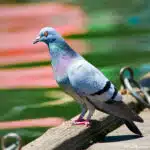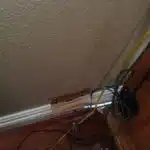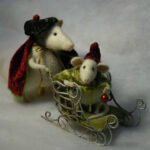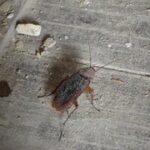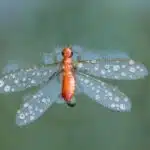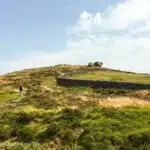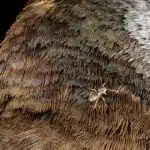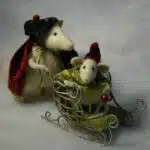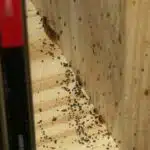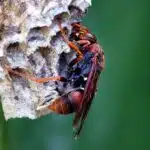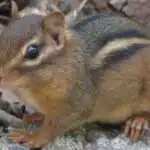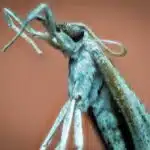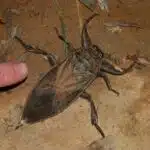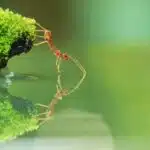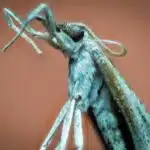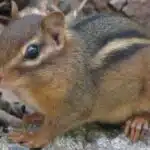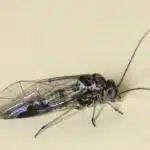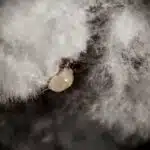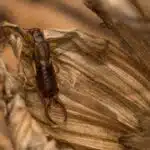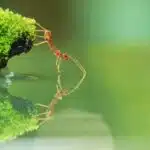Possums, also known as opossums, are common nocturnal animals that can be found in many parts of the United States. While they may seem harmless and even cute to some people, possums can cause damage to gardens, homes, and other property. In addition, they may carry diseases such as leptospirosis and salmonella that can be transmitted to humans and pets.
If you have possums on your property and want to get rid of them, there are several methods you can try. However, it is important to keep in mind that possums are protected by law in some states and killing them without a permit can result in fines or other penalties. As a pest control expert, my goal is to provide you with safe and effective ways to remove possums from your property while also following the laws and regulations in your area.
Identifying Possums On Your Property
Possums, also known as opossums, are common nocturnal animals found in North America. They are often mistaken for rodents due to their similar appearance, but they actually belong to the marsupial family. Possums have a distinct physical characteristic of a long snout with sharp teeth and a hairless prehensile tail that they use for grasping objects.
Possum behavior is generally shy and non-aggressive towards humans, but they can become aggressive if they feel threatened. When startled or frightened, possums will often play dead by collapsing onto their side, sticking out their tongue, and emitting a foul-smelling odor from their anal glands. This behavior serves as a defense mechanism against predators.
If you suspect that possums are living on your property, there are some signs to look out for. Possums typically leave behind droppings that resemble small pellets and may cause damage to gardens or crops by digging holes or rummaging through trash cans. Understanding possum behavior is crucial in effectively removing them from your property without causing harm to the animal or yourself.
Understanding Possum Behavior
One common misconception about possums is that they are aggressive and dangerous, but this is far from the truth. Possums are generally docile creatures that prefer to avoid confrontations with humans or other animals. However, they can become territorial if they feel threatened or cornered.
Understanding possum behavior is crucial in developing effective methods for managing their presence on your property. For instance, one of the most important things to know about possums is their diet. These animals are omnivores and will eat just about anything they can find, including fruits, vegetables, insects, small rodents, and even carrion. This means that if you have a garden or fruit trees on your property, possums may be attracted to them.
Possum behavior during mating season can also influence how they behave on your property. During this time, males become more aggressive and territorial as they compete for mates. They may also make loud hissing noises or emit a foul odor to deter other males from entering their territory. Understanding these behaviors can help you develop strategies for managing possum populations on your property without resorting to lethal methods.
Transition: Now that we understand more about possum behavior, it’s important to assess the damage these animals can cause and develop a plan of action accordingly.
Assessing The Damage Possums Can Cause
Understanding the behavior of possums is crucial in effectively managing their presence on your property. However, it is also important to assess the damage they can cause. Possums are known to chew on electrical wires and insulation, which can lead to potential fire hazards. They may also damage gardens, crops, and fruit trees while foraging for food. Additionally, possums can carry diseases such as leptospirosis, salmonella, and tuberculosis, which can be transmitted to humans and pets.
To prevent possums from causing damage on your property, there are several prevention measures you can take. Firstly, ensure that all garbage cans have tight-fitting lids and do not leave pet food outside overnight. This will discourage possums from scavenging for food in your yard. Secondly, trim back any trees or branches that overhang onto your property as possums use them as a means of entry onto roofs or into attics. Finally, seal any gaps or holes around the exterior of your home to prevent possums from entering.
Assessing possum damage and taking preventative measures is essential in reducing the likelihood of future encounters with these animals. By implementing these steps consistently and regularly monitoring your property for signs of possum activity, you can help keep both your family and pets safe from potential health risks associated with possum infestations. In the next section we will discuss legal considerations for removing possums from your property.
Legal Considerations For Possum Removal
When dealing with possums on your property, there are several legal considerations that should be kept in mind. In many areas, possums are considered protected wildlife and cannot be killed or harmed without a permit. It is important to check with local authorities before attempting to remove possums from your property to avoid any legal issues.
In addition to legal considerations, there may also be ethical concerns surrounding the removal of possums. While they can be a nuisance and cause damage to property, they are also important members of their ecosystem and play a role in controlling pest populations. Before taking action to remove possums, it is important to consider the impact it may have on the local environment.
Overall, when considering how to get rid of possums from your property, it is important to keep both legal and ethical considerations in mind. By doing so, you can ensure that you are taking the appropriate steps while minimizing any negative impact on the environment.
Looking for alternative solutions? Hiring a professional pest control service can provide effective and humane removal options while also ensuring that all legal requirements are met.
Hiring A Professional Pest Control Service
- Professional pest control services typically come with a cost, and it is important to determine the initial cost of hiring a professional before making a decision.
- Professional pest control services will have the experience and expertise to help ensure effective management of the pest problem.
- Hiring a professional pest control service can help take the stress of dealing with a pest problem off of the homeowner.
- Professional pest control services can provide preventative strategies to help guard against future infestations.
- Hiring a professional pest control service can help to protect the health of the inhabitants of the property.
- Professional pest control services can help to identify potential entry points for pests and provide solutions to seal them off.
Hiring Costs
Are you tired of possums invading your property? Do you want to hire a professional pest control service but are worried about the costs? Let me tell you that there are cost-effective solutions available to get rid of these marsupials.
Hiring a professional pest control service can be expensive, but it is worth it in the long run. These professionals have the expertise and equipment to effectively remove possums from your property. However, if you are on a tight budget, there are DIY options available as well. You can try using repellents or setting traps yourself.
When it comes to hiring costs, it is important to do your research and compare prices from different pest control companies. Look for companies that offer free inspections and consultations so that you can get an accurate estimate of the costs involved. Remember, while DIY options may seem cheaper at first glance, they may not be as effective in the long run and could end up costing you more money in the end.
In conclusion, getting rid of possums from your property can be challenging but not impossible. Consider hiring a professional pest control service or trying some DIY options before making a decision. Don’t let costs deter you from taking action – there are cost-effective solutions available for every budget.
Professional Experience
When it comes to possum control and wildlife management, hiring a professional pest control service with years of experience is highly recommended. These professionals have the necessary skills, tools, and knowledge to handle different types of pests effectively. In addition, they can provide you with valuable advice on how to prevent future infestations.
A professional pest control service with extensive experience in possum control knows where to look for these marsupials and their nests. They use humane methods to capture and relocate them without harming them. Moreover, they can identify potential entry points and seal them off, preventing any future infestations.
In summary, when it comes to dealing with possums or any other type of pest infestation on your property, the expertise of a professional pest control company cannot be overstated. They have the necessary skills and equipment needed to eradicate these pests effectively while providing valuable advice on how to maintain a pest-free environment in the long run.
Benefits Of Hiring
When it comes to pest control, hiring a professional service is highly recommended for homeowners. Not only do they have the necessary skills and equipment to handle different types of pests effectively, but they can also provide valuable advice on how to prevent future infestations. In addition, hiring a professional pest control service can be cost-effective in the long run when compared to DIY methods.
One of the main benefits of hiring a professional pest control service is their expertise in identifying the root cause of your pest problem. Instead of just treating the symptoms, they can identify the source of the infestation and take appropriate measures to eradicate it. This not only ensures that your property is free of pests but also prevents any future reinfestations.
Another benefit of hiring a professional pest control service is cost-effectiveness. While DIY methods may seem cheaper initially, they are often ineffective and require multiple treatments. On the other hand, a professional service can provide a one-time solution at an affordable price while ensuring that your property remains pest-free in the long run. In addition, some pest control companies offer warranties or guarantees for their services, giving homeowners peace of mind knowing that their investment is protected.
In conclusion, hiring a professional pest control service has many benefits for homeowners looking to rid their properties of pests. From their expertise in identifying and eradicating pests to their cost-effectiveness compared to DIY methods, there are many reasons why working with professionals is the best choice for homeowners seeking to create a safe and healthy living environment.
Using Repellents To Deter Possums
Hiring a professional pest control service can be an effective way to remove possums from your property. However, if you prefer to handle the issue yourself, there are several methods available that you can consider. One option is to use natural repellents to deter possums. These include peppermint oil, garlic, vinegar, and ammonia. These substances emit strong odors that can irritate and discourage possums from entering your property.
Another alternative is to use commercial repellents that are specifically designed for possums. These products contain ingredients such as capsaicin and predator urine that can repel possums effectively. Before purchasing any commercial repellent, make sure to read the label carefully and follow the instructions closely. Some products may not be safe for pets or children.
When using natural or commercial repellents, it’s important to note that they may not work immediately and may require frequent reapplication. Additionally, these methods may not be effective against highly determined possums who have already found a source of food on your property. To increase their effectiveness, it’s recommended to combine them with other methods like removing attractants from your property.
To further prevent possums from coming onto your property, it’s crucial to eliminate anything that could be attracting them in the first place. This means securing trash cans with tight-fitting lids, removing pet food bowls at night, and trimming overhanging branches near your house. By reducing access to food and shelter, you can create an environment that is less attractive to possums and more conducive to their natural habitat elsewhere.
Removing Attractants From Your Property
To effectively get rid of possums from your property, it is essential to remove any attractants that might lure them in. Possums are omnivores and will feed on anything from fruits and vegetables to insects and small animals. Thus, it is crucial to eliminate all potential food sources present in your yard or garden.
Creating barriers, whether natural or artificial, can help keep possums away from your property. Fences made of metal or wire mesh can be an effective physical barrier against possums. Alternatively, planting thorny bushes around the perimeter of your property can create a natural barrier that will deter these critters from entering your yard.
Removing food sources such as fruit trees or pet food is also necessary to get rid of possums. Make sure to pick up any fallen fruits or nuts from your yard regularly, and store pet food indoors overnight. This will reduce the likelihood of attracting possums into your yard, thereby reducing their chances of establishing a habitat on your premises.
To further prevent possum infestation, sealing entry points to your home is crucial. These pests can enter through small gaps and holes in walls and roofs; therefore, sealing these entry points with caulk or other materials can significantly reduce the likelihood of possum invasion. By following these simple steps, you’ll be able to make your property less attractive to possums while ensuring that they stay away for good!
Sealing Entry Points To Your Home
Sealing entry points to your home is one of the most effective ways to prevent possums from entering. When it comes to sealing, you have two options: DIY or professional. If you choose to do it yourself, make sure you thoroughly inspect your property for any potential entry points. This includes checking areas such as vents, chimneys, and gaps in doors and windows. Once you have identified these areas, use materials such as steel wool or caulking to seal them off.
While DIY sealing can be effective in the short term, it may not provide a long-term solution. Possums are persistent creatures and can find new entry points if they are determined enough. Hiring a professional pest control company can be more expensive but provides a long-lasting solution. Professional pest control experts have the knowledge and tools needed to identify all possible entry points and seal them off completely.
Remember that sealing entry points is just one part of a larger plan for possum prevention. It’s important to combine this method with other strategies such as setting traps and removing food sources. By doing so, you can effectively remove possums from your property and prevent them from returning in the future.
Transition: While sealing entry points is an effective way to keep possums out of your home, it may not always be enough. In the next section, we will discuss how to set traps for possums and safely remove them from your property.
Setting Traps For Possums
Sealing entry points to your home may prevent possums from entering, but it doesn’t guarantee that they will leave your property. These nocturnal creatures are notoriously hard to get rid of, and unfortunately, they can cause a lot of damage in the process. If you’re dealing with a possum infestation in your yard or garden, it’s time to consider setting traps.
Possum bait options include fresh fruits and vegetables, peanut butter, cat food, and even marshmallows. However, it’s important to note that possums are opportunistic eaters and will scavenge for food wherever they can find it. Therefore, make sure to secure any garbage or compost bins and keep pet food indoors at night. When selecting bait for your trap, choose something that smells strongly and is appealing to possums.
Best trap placement is crucial when trying to catch these elusive creatures. Place the trap near where you have seen them or where you suspect their den is located. Possums prefer dark, enclosed spaces like sheds or under decks, so check those areas first. Once caught, release the possum at least five miles away from your property in a wooded area with plenty of natural shelter and water sources.
Dealing with baby possums requires a different approach than trapping adults. Check for any babies before setting traps as separating them from their mother can lead to their death. If you do find babies without their mother nearby, contact a wildlife rehabilitation center for assistance in rehoming them safely. Remember that possums play an important role in our ecosystem by controlling insect populations and should be treated humanely during removal attempts.
Dealing With Baby Possums
Possums are marsupials, which means that females give birth to underdeveloped young that continue to develop in the mother’s pouch. If you have a possum infestation on your property, there is a good chance that you will come across baby possums. It is important to know how to deal with them properly as they require special care.
Feeding habits of baby possums are crucial for their survival. They require milk from their mother or a surrogate mother if the original mother is not available. Providing them with cow’s milk or other substitutes can be harmful, so it’s best to seek advice from an expert who has experience in caring for baby possums. Feeding them too much or too little can also have negative consequences, so it’s important to get it right.
Maternal care is essential for baby possums, and separating them from their mothers should be avoided if possible. However, if the mother is deceased or injured beyond repair, it may be necessary to remove the babies for their own safety. In this case, it’s important to handle them gently and provide warmth and comfort until they can be taken to a wildlife rehabilitation center.
When dealing with baby possums, it’s important to remember that they require special care. Their feeding habits and maternal care are crucial for their survival, and seeking advice from an expert is highly recommended. Separating them from their mothers should only be done as a last resort in cases where the mother is unable to care for her young. In the next section, we will discuss how to relocate possums to a new habitat without causing harm or distress.
Relocating Possums To A New Habitat
After dealing with baby possums, the next step is to consider relocating adult possums to a new habitat. Possum relocation can be an effective solution for homeowners who want to remove these creatures from their property without resorting to lethal methods. However, it is important to keep in mind ethical concerns when relocating wildlife.
One of the main ethical concerns with possum relocation is the potential harm it can cause to both the animal and its new environment. When choosing a new habitat, it’s essential that it provides adequate food, water, and shelter for the possum. Additionally, relocation should only take place during times when there is no competition for resources in the target area.
To ensure that possum relocation is done in an ethical manner, homeowners should consider working with a licensed pest control professional or wildlife rehabilitator. These experts have experience in identifying suitable habitats and can provide guidance on how to minimize stress during transportation. They can also monitor the possum after release to make sure it successfully adapts to its new environment.
Table:
| Pros | Cons |
|---|---|
| Humane method of removal | Can be expensive |
| No harm done to animal | May not solve underlying problems |
| Avoids use of lethal methods | May cause stress or harm during transport |
In summary, relocating possums to a new habitat can be an effective and humane solution for homeowners dealing with these creatures. However, ethical concerns must be taken into account throughout the process. Working with licensed professionals can help ensure that the relocation process is done safely and effectively. If all other options have been exhausted, humane euthanasia may need to be considered as a last resort.
Humane Euthanasia As A Last Resort
Humane euthanasia should only be considered as a last resort in dealing with possums on your property. Before considering this option, humane trapping and controlled release should be explored. Humane trapping involves using a live trap to capture the possums without harming them, after which they can be released back into the wild in a suitable location.
Controlled release is important when it comes to releasing possums back into the wild. This involves releasing them in an area where they are less likely to cause problems for other people or animals. It is also essential to ensure that there is enough food and water available for the possums in their new environment. This will ensure that they are able to adapt and thrive in their new surroundings.
To avoid future infestations of possums on your property, it is important to take steps to possum-proof your property. This includes sealing up any holes or gaps around your home that could provide access for possums, such as gaps under roofs or around doors and windows. Additionally, removing any potential food sources from around your property, such as fruit trees or compost piles, can help deter possums from coming onto your property in the first place.
- Use humane trapping methods before considering euthanasia
- Release captured possums in a suitable location
- Ensure enough food and water for released possums
- Possum-proof your property by sealing up entry points and removing potential food sources
In order to prevent future infestations of possums on your property, it is important to take these steps seriously. By using humane methods of removal and release, you can ensure that the possum population remains healthy while protecting your own home from damage caused by their presence.
Preventing Future Possum Infestations
Humane euthanasia should always be considered as a last resort when dealing with possum infestations. However, in most cases, there are alternative ways to get rid of these creatures without harming them. Creating barriers is an effective and humane way to keep possums away from your property.
The first step in creating barriers is to seal off any potential entry points. Possums can fit through very small openings, so it’s important to thoroughly inspect your property for gaps or holes that they could use to gain access. Additionally, you can install physical barriers such as fences or mesh screens around your property to prevent possums from entering.
Proper waste disposal is another key factor in preventing future possum infestations. Possums are attracted to garbage and other food sources, so it’s important to securely store all trash and compost bins. It’s also a good idea to clean up any fallen fruit or birdseed from your yard, as these can also attract possums. By taking these steps, you can significantly reduce the likelihood of future possum infestations on your property.
Transition: While creating barriers and proper waste disposal are crucial for preventing future possum infestations, cleaning and disinfecting after removing them is just as important.
Cleaning And Disinfecting After Possum Removal
As the saying goes, prevention is better than cure. In the case of possum infestations, cleaning and disinfecting after removal is just as important as getting rid of them in the first place. Possums can leave behind feces, urine, and other potentially harmful substances that can lead to health hazards. Therefore, it is crucial to clean and disinfect your property thoroughly.
When it comes to cleaning methods, using a vacuum cleaner with a HEPA filter is highly recommended for removing any droppings or debris left by possums. After vacuuming, use a damp cloth or mop to wipe down surfaces and floors with warm soapy water. Be sure to wear gloves during this process to avoid direct contact with any hazardous materials.
After cleaning, disinfectant types should be chosen carefully based on their ability to eliminate bacteria and viruses effectively. The CDC recommends using EPA-registered disinfectants such as hydrogen peroxide or bleach solution diluted with water. These products can kill 99.9% of germs and viruses while ensuring your property remains safe for humans and pets.
In conclusion, cleaning and disinfecting your property after possum removal is crucial for preventing potential health hazards from emerging. By using proper cleaning methods and disinfectant types such as hydrogen peroxide or bleach solutions diluted with water, you can ensure that your home remains safe for everyone who enters it. Next up: educating your neighbors about possums!
Educating Your Neighbors About Possums
One effective way of managing possums on your property is by educating your neighbors about the habits and behavior of these creatures. By informing them how possums behave, they will be less likely to attract or feed them, which in turn reduces their population in the area. You can start by explaining how possums are nocturnal and usually forage at night time, looking for food sources such as fruits, insects, and small animals. It is important to note that while possums may look cute and cuddly, they can carry diseases such as leptospirosis and salmonella.
Another crucial aspect of educating your community about possums is teaching children about safety measures when encountering these animals. Possums are generally non-aggressive creatures but may become defensive if they feel threatened or cornered. Children should be taught not to approach or provoke possums and to keep a safe distance whenever possible. Moreover, it is important to emphasize that feeding possums can lead to dependency on human-provided food sources, making them more likely to return frequently.
To make it easier for you to educate your neighbors about possum behavior, you can use the table below as a quick reference guide:
| Possum Habits | Explanation |
|---|---|
| Nocturnal | Active during the night time |
| Omnivorous | Eats both plants and animals |
| Good climbers | Able to climb trees and fences |
| Non-aggressive | Usually docile unless threatened |
By sharing this information with your neighbors, you can help create a safer environment for everyone in the community. In addition to reducing conflict between humans and possums, educating others about these creatures can also promote respect for wildlife and encourage responsible management practices. Remember that every small action counts towards building a healthier ecosystem for all living things.
Conclusion
Possums can be a nuisance to homeowners, causing damage to gardens and property. Identifying possums on your property is the first step in understanding their behavior and the extent of damage they can cause. It is important to assess legal considerations before attempting to remove possums from your property.
Hiring a professional pest control service is the safest and most effective way to remove possums. However, humane euthanasia may be necessary as a last resort. Preventing future possum infestations involves securing trash cans, removing food sources, and closing off potential entry points.
Cleaning and disinfecting after possum removal is crucial for maintaining a healthy environment. Educating your neighbors about possums can also help prevent future infestations. As a pest control expert, it is important to prioritize safety and humane treatment of animals while effectively addressing the issue at hand.
Image Credits
- “‘Playing Possum’, a Little Thing that turned out to be a happy experience.” by Bennilover (featured)

